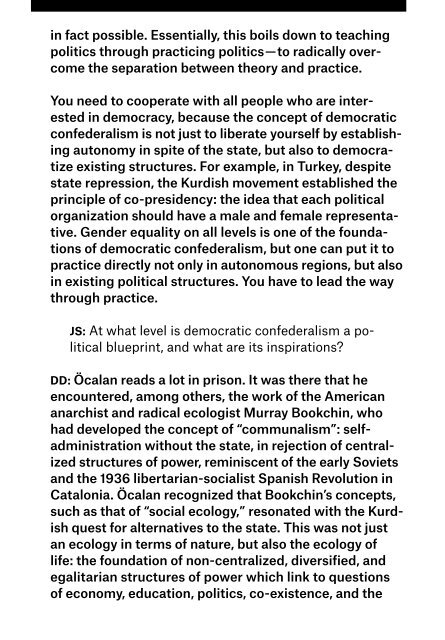Stateless Democracy
NWA5-Stateless-Democracy1.pdf?utm_content=buffer7beda&utm_medium=social&utm_source=twitter
NWA5-Stateless-Democracy1.pdf?utm_content=buffer7beda&utm_medium=social&utm_source=twitter
You also want an ePaper? Increase the reach of your titles
YUMPU automatically turns print PDFs into web optimized ePapers that Google loves.
in fact possible. Essentially, this boils down to teaching<br />
politics through practicing politics — to radically overcome<br />
the separation between theory and practice.<br />
You need to cooperate with all people who are interested<br />
in democracy, because the concept of democratic<br />
confederalism is not just to liberate yourself by establishing<br />
autonomy in spite of the state, but also to democratize<br />
existing structures. For example, in Turkey, despite<br />
state repression, the Kurdish movement established the<br />
principle of co-presidency: the idea that each political<br />
organization should have a male and female representative.<br />
Gender equality on all levels is one of the foundations<br />
of democratic confederalism, but one can put it to<br />
practice directly not only in autonomous regions, but also<br />
in existing political structures. You have to lead the way<br />
through practice.<br />
JS: At what level is democratic confederalism a political<br />
blueprint, and what are its inspirations?<br />
DD: Öcalan reads a lot in prison. It was there that he<br />
encountered, among others, the work of the American<br />
anarchist and radical ecologist Murray Bookchin, who<br />
had developed the concept of “communalism”: selfadministration<br />
without the state, in rejection of centralized<br />
structures of power, reminiscent of the early Soviets<br />
and the 1936 libertarian-socialist Spanish Revolution in<br />
Catalonia. Öcalan recognized that Bookchin’s concepts,<br />
such as that of “social ecology,” resonated with the Kurdish<br />
quest for alternatives to the state. This was not just<br />
an ecology in terms of nature, but also the ecology of<br />
life: the foundation of non-centralized, diversified, and<br />
egalitarian structures of power which link to questions<br />
of economy, education, politics, co-existence, and the<br />
importance of women’s liberation. What is explicit in<br />
both Bookchin and Öcalan’s thoughts is the idea of working<br />
“despite of” what is happening around you — in other<br />
words, to act through practice. But Bookchin is not the<br />
only foundational thinker who shaped Öcalan’s thoughts;<br />
in his writings, he references Michel Foucault and Immanuel<br />
Wallerstein, among many others.<br />
Democratic confederalism is built on the work of many<br />
thinkers, but it is customized to the particularities of the<br />
oppression that takes place in Kurdistan. It considers the<br />
question of how to build an alternative to the state — for<br />
and by the people — independent of the international<br />
order, while also taking into account the specific oppressive<br />
regimes of the region. This is why the insistence is<br />
always on regional governments and regional autonomy,<br />
even though the model of democratic confederalism is<br />
proposed for the entire Kurdish region. Each region has<br />
to discover what works best for it, all the while adhering<br />
to the principles of gender equality, ecology, and radical<br />
grassroots democracy. These are the pillars of democratic<br />
confederalism that stand beyond dispute.<br />
JS: The model of democratic confederalism has recently<br />
found its full implications in the northern part<br />
of Syria, in the so-called Rojava Revolution, led by<br />
Kurdish revolutionaries. Could you explain what the<br />
Rojava Revolution is?<br />
DD: Rojava is the Kurdish word for “West,” referring to<br />
West Kurdistan, or if we look at the present geopolitical<br />
map, it is the northern part of Syria, which knows a large<br />
population of Kurds. The Rojava Revolution was triggered<br />
by the so-called Arab Spring uprisings of 2012, but<br />
the origins and background of the movement go back<br />
42–43


